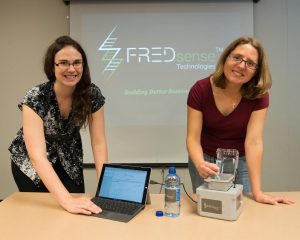The Mentor Capital Network interviewed David Lloyd, Cofounder and Chief Operating Officer of FREDsense Technologies, on April 14, 2016.
FREDsense technologies participated in the MCN Sustainable Business Plan collaboration in 2014. FREDsense combines biology and engineering to detect chemicals in your water. They use a biosensor with an electrochemical output to create a system that is fast, sensitive, and unlike anything else on the market, allowing anyone to know exactly what is in their water. David Lloyd discusses with the MCN the journey of how they managed to mix science and business to develop a game changing technology.

Tell me about FREDsense Technologies, how it started, and the motivation behind it.
FREDsense Technology is a biosensor design company. We genetically modify organisms to turn them into electrical sensors and develop hardware and software solutions around these organisms to turn them into portable field tests. Basically, we are creating a technology that you can take out into the environment to detect chemicals in the water instead of bringing in samples to a local lab.
We were six co-founders, graduates and undergraduates of the University of Calgary and we were part of a competition at MIT called iGEM (the International Genetically Engineered Machines Competition) and we won lots of awards for developing this technology. We then decided not to let this just die after the competition and develop and commercialize the technology further. We spent the next couple of years bootstrapping and we put together CAD $5,000 to build out a molecular biology lab to develop our technology. We started to grow as we got some seed capital from several business plan competitions.
We realized that we had an opportunity to solve a huge and global problem in terms of understanding what’s in people’s water and be able to quickly and reliably know when there might be something toxic.
How did you become interested in this problem?
We were a group of technologists who wanted to use the genetic engine and synthetic biology to change the world. Being in Alberta, Canada, we started looking at the oil and gas industry and the environmental impact they had. Fortunately, there was a chance to apply for a grant while we were students to tackle that issue and we knew that if we developed this technology we could have a significant impact.
What were the hardest parts of launching your company?
We ran into a ton of challenges and we still continue to run into them. The hardest thing was that we had no idea what it meant or how to start a business. In other words, understanding what it would take to make it happen and getting the right skill set together. Communication was a real issue for us, because our product is so specific we needed to learn how to speak business language and explain what we do in simple terms.
Finding ways to access funding was a huge issue. As students, our ideas were new and we lacked the credibility of professors who had years of publications to back their work. This forced us to get scrappy and creative with how to use the funds we could get access to. This is definitely a lesson we will take with us as we move into raising second round of seed capital.
Fundraising is clearly a priority now. What plans do you have for it?
We have closed a Friends and Family round of $115,000. Currently we are looking to raise our next round from angel investors in conjunction with non-dilutive government grants for research and development. We are also looking at government funding that is specific for businesses in Canada.
How many employees did you bring on so far?
We have 14 people involved with the company that includes consultants, employees, and founders. We are pre-revenue so still relatively small. Currently we are just looking to finalize field demonstration partners. This is critical before we get to market. We have some paid pilots in negotiation so hopefully we will be bringing in revenue in a couple of months.
One of the things we want our companies to think about is the differentiation between beneficiaries and customers? How would you describe those for FREDsense Technologies?
Well, we are a B2B company so our customers are mainly people in the environmental consulting space who have issues monitoring the water in their communities. We offer a technology that allows them to offer additional services. I guess I would say the clients of our clients are our beneficiaries. Also you, me and everyone else are definitely beneficiaries. We aim to bring cleaner, less toxic water to everyone for the good of the entire human race and the planet.
What plans do you have for FREDsense Technologies?
We are incredibly busy now. We are looking for a place where we can do a demo for the product. Our plan is to finally bring it out to market by 2017. Another longer term plan is to diversify our technology; today we detect one chemical but we aim to continue developing new products so we can detect multiple chemicals. The overall plan is to start showing impact in the industry we are in and help companies increase process efficiency and measure their environmental impact.
How has your participation with Mentor Capital Network been helpful to you?
When we applied we had already been through a lot of competitions, but what was very pleasing about the Mentor Capital Network was the transparency of the process. Another thing that we weren’t expecting was the detailed feedback; the judges commented on everything we wrote down. It was really important to help us get to where we are today, it helped structure our pitch and business deck.
Learn more about FREDsense on their website.